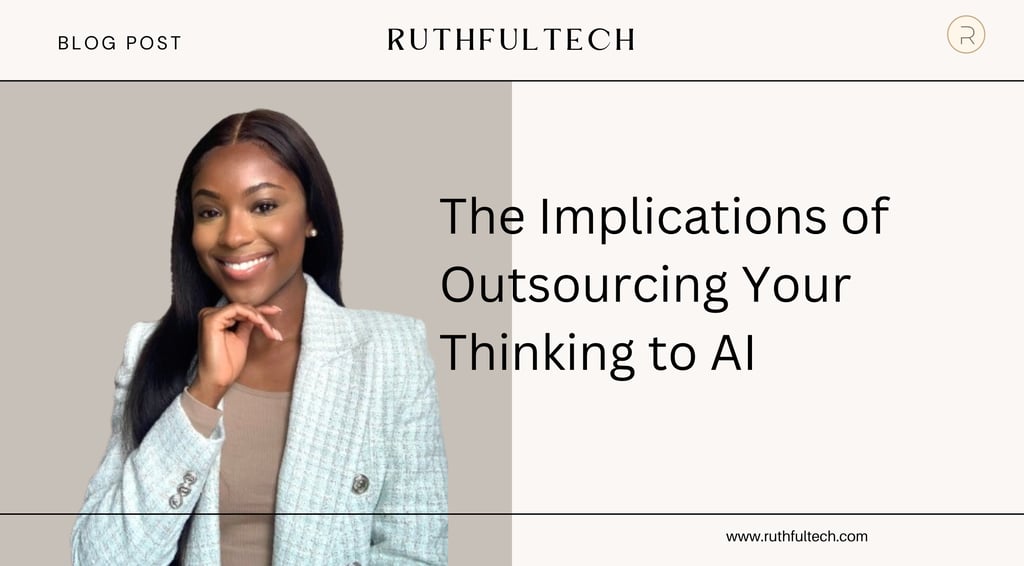The Implications of Outsourcing Your Thinking To AI
TECH NEWBIESLIFESTYLETECHNICAL LEARNINGMINDSET
8/25/20253 min read
If you turn to ChatGPT every time you need an idea or a quick fix, this post is for you.
And don’t feel bad about it. I do it too. In fact, I was tempted to use ChatGPT to shape this very post. But I stopped myself, because I wanted to sit with my own thoughts and wrestle with them first. Otherwise, what would that mean for me in the long run?
This came up at a recent event I attended. A group of us ended up in a spirited discussion about AI. Two very different sides of the argument stood out.
Argument One: AI is Making Us Dumber
This group believes that outsourcing thinking to AI will eventually erode our ability to think critically. They argued that before tools like ChatGPT were widely available, students had to dig into books, cross check sources, and build their own conclusions. That process itself was training. It strengthened mental muscles like diligence, research, and skepticism.
The fear is that with AI, those skills may atrophy. The more we rely on an external brain, the less we exercise our own.
Argument Two: AI is Killing Creativity
The second concern is creativity. In the past, you might have stared at a blank page while trying to brainstorm a logo or struggled for hours to find the right words for an essay. Now you can type a few prompts and have a draft, a design, or even a fully fleshed out idea within minutes.
Sounds convenient, right? But like any muscle, the creative brain needs use. What happens if we stop flexing it? Will future generations still have the capacity to create, or will they only know how to consume and remix what an algorithm gives them?
This is where the fear deepens. Creativity is part of what makes us human. If we hand it over entirely, do we risk losing the very essence of our humanity?
But… is it really that bad?
On the flip side, is outsourcing some of our thinking actually a problem?
There is something powerful about AI leveling the playing field. Someone who struggles with writing can now communicate clearly. Someone who cannot afford therapy can use AI as a first step toward support. Someone who has never been good at research can now surface insights more easily.
We have always used tools to extend ourselves. The camera reduced the need to paint every moment by hand. The calculator reduced the need to do complex math in our heads. Few would argue that those inventions destroyed human potential. Instead, they shifted it.
So maybe the fear of brain atrophy is simply resistance to change. Maybe it is less about loss and more about evolution.
The Hidden Risk
But here is something we don’t talk about enough. AI is trained on human data. Decades of our collective writing, creating, and problem solving. If we stop generating original ideas and outsource all of our thinking to AI, where does that leave the models? Without fresh human input, does the system stagnate? Does it eventually regress?
There is also a more practical risk. What happens when the servers go down, the internet cuts off, or access is restricted? If we have built a habit of turning to AI for every question, how productive will we be without it?
I came across a study, published in Societies that spoke about the erosion of expertise. Over time, when people outsource complex tasks to AI, they risk losing the ability to critically evaluate information. This creates what the researchers called “cognitive debt,” where individuals can no longer perform tasks without AI’s assistance.
So, Where Do We Go From Here?
There is no doubt AI has changed the game. It has enabled us to work faster and more accurately than ever. The challenge is not the tool itself but how we use it.
We each have a responsibility to decide when to reach for AI and when to let our own brain do the heavy lifting. To maintain curiosity. To exercise critical thinking. To allow space for creativity even when it feels slower.
Because in the end, it is not about whether AI makes us dumber or less creative. It is about whether we allow it to replace the parts of us that make us human.
If you enjoyed this post, you'll love these:
Reflecting on my first year as a SWE
8 Goals You Should Be Setting As A Developer
Until next time,
Ruth




